| Srl | Item |
| 1 |
ID:
140085
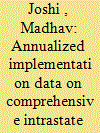

|
|
|
|
|
| Summary/Abstract |
This article introduces the Peace Accords Matrix Implementation Dataset (PAM_ID). We present time-series data on the implementation of 51 provisions in 34 comprehensive peace agreements negotiated in civil wars since 1989. We follow the implementation process for up to ten years following the signing of each agreement. The data provide new insights into the types of provisions that are more or less likely to be implemented, how implementation processes unfold over time, how implementation processes relate to one another, and how implementation affects various post-accord outcomes. We outline our coding methodology and case selection, and examine descriptive statistics. We illustrate one potential use of the data by combining eight different provisions into a composite indicator of security sector reform (SSR). A survival analysis finds that implementing security sector reforms contributes to long-term conflict reduction not only between the parties to the accord but also between the government and other non-signatory groups in the same conflict.
|
|
|
|
|
|
|
|
|
|
|
|
|
|
|
|
| 2 |
ID:
143321
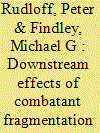

|
|
|
|
|
| Summary/Abstract |
We consider whether the fragmentation of combatants during civil war has downstream effects on the durability of peace following civil wars. We contend that the splintering of combatant groups, a primary manifestation of rebel group fragmentation, produces potential spoiler groups that are neither incidental nor unimportant in the process of civil war resolution. Making connections to the spoiling and credible commitment literatures, we hypothesize that rebel splintering hastens the recurrence of civil wars. Using event history modeling and propensity score matching to analyze two different civil war datasets, we examine whether the occurrence of fragmentation during a civil war influences the length of peace after the civil war. The empirical analysis of fragmentation events during civil wars since World War II offers support for the hypothesis that splintering decreases the duration of post-civil war peace. The results suggest the need to pay closer attention to the dynamics of fragmentation, and particularly how these dynamics lead to future consequences – even when those consequences take place after the war has concluded. For example, governments that attempt to splinter groups or to use existing fragmentations within rebel groups to end a civil war may encourage the unintended consequence of shorter peace duration.
|
|
|
|
|
|
|
|
|
|
|
|
|
|
|
|
| 3 |
ID:
166784
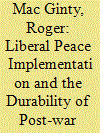

|
|
|
|
|
| Summary/Abstract |
This article examines the correlation between the implementation of liberal peace provisions in peace accords and the duration of peace by drawing on data from the Peace Accords Matrix that comprises 34 comprehensive peace agreements signed in the post-Cold War period. Our key findings confirm that the duration of peace is improved when the liberal aspects of peace included in peace accords are implemented. In addition, the article examines peace duration in relation to UN peacekeeper deployment and mechanisms for peace accord verification – in an attempt to establish factors that enhance the duration of peace. Peacekeeping is found to have a positive impact, while verification mechanisms do not. The findings highlight the need to unpack and scrutinize more thoroughly the complex roles of liberal peacemaking.
|
|
|
|
|
|
|
|
|
|
|
|
|
|
|
|
| 4 |
ID:
117017
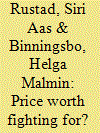

|
|
|
|
|
| Publication |
2012.
|
| Summary/Abstract |
While a number of publications show that natural resources are associated with internal armed conflict, surprisingly little research looks at how natural resources affect post-conflict peace. This article therefore investigates the relationship between natural resources and post-conflict peace by analyzing new data on natural resource conflicts. We argue that the effect of natural resources on peace depends on how a country's natural resources can constitute a motive or opportunity for armed conflict. In particular, three mechanisms may link natural resources to conflict recurrence: disagreements over natural resource distribution may motivate rebellion; using natural resources as a funding source creates an opportunity for conflict; and natural resources may aggravate existing conflict, acting either as motivation or opportunity for rebellion, but through other mechanisms than distributional claims or funding. Our data code all internal armed conflicts between 1946 and 2006 according to the presence of these resource-conflict links. We claim such mechanisms increase the risk of conflict recurrence because access to natural resources is an especially valuable prize worth fighting for. We test our hypotheses using a piecewise exponential survival model and find that, bivariately, armed conflicts with any of these resource-conflict mechanisms are more likely to resume than non-resource conflicts. A multivariate analysis distinguishing between the three mechanisms reveals that this relationship is significant only for conflicts motivated by natural resource distribution issues. These findings are important for researchers and policymakers interested in overcoming the 'curse' associated with natural resources and suggest that the way forward lies in natural resource management policies carefully designed to address the specific resource-conflict links.
|
|
|
|
|
|
|
|
|
|
|
|
|
|
|
|
| 5 |
ID:
105236
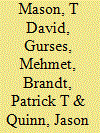

|
|
|
|
|
| Publication |
2011.
|
| Summary/Abstract |
We argue that the duration of the peace after civil wars is mainly a function of the extent to which the outcome of the previous civil war preserved a condition of multiple sovereignty and the extent to which the post-civil war environment creates incentives for dissident groups to resort to violence rather than sustain the peace. Hazard models suggest that the outcome of the previous conflict does affect the duration of the peace, and this effect varies across time. The introduction of peacekeeping forces has a substantial positive effect on peace duration. We also find evidence of a curvilinear relationship between ethnic fractionalization and post-civil war peace duration. Based on these results, we conclude with recommendations for how peace can be maintained after a civil war.
|
|
|
|
|
|
|
|
|
|
|
|
|
|
|
|